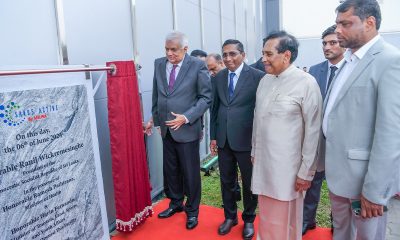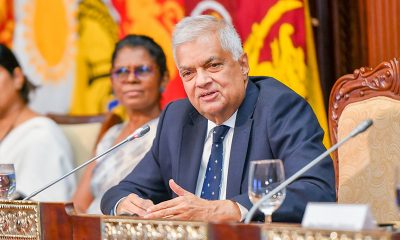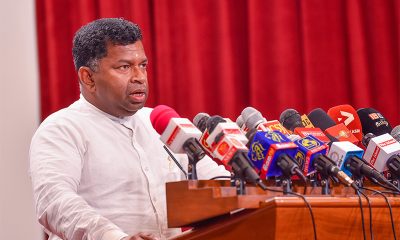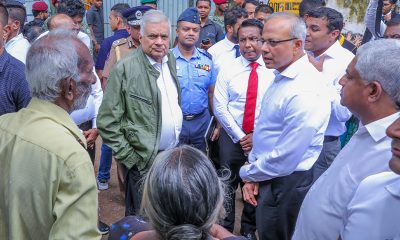Latest News
Withdrawing from the IMF agreement would jeopardize the trust in Sri Lanka’s economy – President
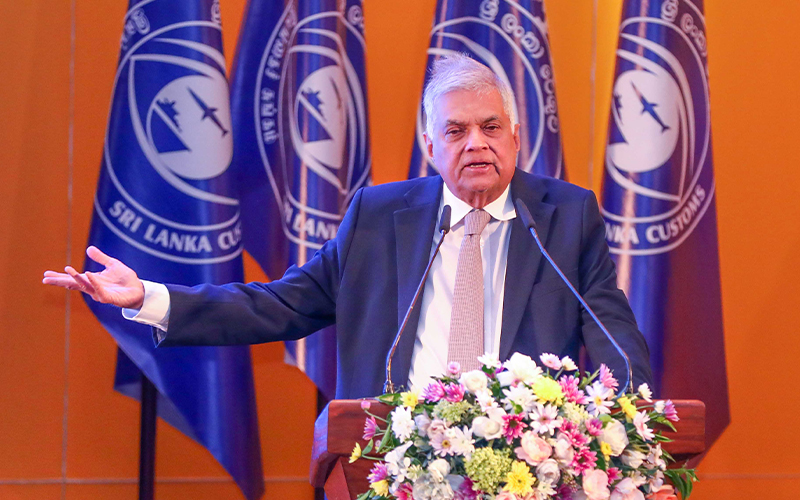
President Ranil Wickremesinghe extended an invitation to all political party leaders in the Parliament to engage in discussions with the Managing Director of the International Monetary Fund (IMF) on the implementation of the agreement with the IMF.
Emphasizing the importance of unity in leading the country to success, he reiterated that withdrawing from the agreement would jeopardize the trust in Sri Lanka’s economy. The President stressed that the nation’s economy suffered due to the politics of promises, emphasizing the need for all political parties to formulate comprehensive plans for the country’s development when gearing up for an election.
President Ranil Wickremesinghe made these remarks during the International Customs Day celebrations at the Colombo Customs Headquarters this morning (26).
The President expressed gratitude to all members of the Customs Department for their contributions to the customs revenue in 2023. Highlighting customs tax, VAT and income tax as the three primary sources of income globally, the President stressed the importance of enhancing the efficiency of the customs service to boost the country’s revenue. He further noted that upcoming government legislation and modernization initiatives will overhaul all public revenue-generating institutions.
President Ranil Wickremesinghe delivered six Certificates of Merit to customs officials for rendering exceptional services to the International Customs. The Director General of Sri Lanka Customs, Sarath Nonis, presented the Strategic Plan for 2024 to President Wickremesinghe and State Minister for Finance, Ranjith Siyambalapitiya.
Additionally, a memento was presented to the President by the Director General of Sri Lanka Customs.
President Ranil Wickremesinghe, offering additional remarks, stated:
“The Customs Department holds a significant historical position, being considered one of the oldest government departments in Sri Lanka. Historical records indicate that customs taxes were collected around 2000 years ago at the ancient port of Manthai. From the Anuradhapura era, through the Kotte era and into the Kandy era, customs revenue has played a pivotal role in the nation’s existence.
I express my gratitude to the Customs Department for their contribution in helping us overcome the economic crisis faced in 2022. Customs duties, VAT and income taxes stand as the three primary sources of income for nations globally. In the contemporary landscape of international trade agreements, regional trade agreements and free trade agreements, our focus should be on enhancing income. To achieve this, the current customs services need to operate with efficiency.
While we are unable to allocate additional staff to your department, your commendable performance highlights the potential for substantial revenue improvement. There is a considerable journey ahead, and the government is firmly committed to the comprehensive modernization of customs and other revenue departments, which includes the imminent introduction of new legislation.
This initiative is a crucial component of the measures undertaken to steer the country out of the economic crisis. The decisions made in 2023 have paved the way for recovery from the economic downturn of 2022, although the journey is on-going. By the end of this year, our aim is to elevate the country’s income to 12% of the GDP. By 2026, we target a further increase to 15%.
To achieve this, income must be generated from the existing economy, necessitating economic development. The pressing question today is how to facilitate this economic growth. The out-dated economic system is incapable of propelling the country forward. The reliance on daily loans led to the collapse of the country’s economy. It is imperative to overhaul this economic system for sustainable progress.
We are still grappling with challenging times. In 2021, we faced shortages of essential goods, including medicine, fertilizer and fuel. Today, these necessities are available, with associated costs. The Cost of living is still felt by everyone. Economic development is crucial to alleviating these issues. While it is a wish that the economic damage of 2022 could be swiftly undone, the reality is that we need to transition to a new economy.
To stimulate economic growth, we must focus on a competitive market, bolster exports, and increase foreign exchange reserves. An agreement with Thailand is set to be signed on February 3rd, marking an opportunity for collaboration. While Thailand shares a Theravada Buddhist heritage with Sri Lanka, our respective economic paths have diverged, leading to discernible differences today.
Our actions today shape the future economy of our country. It necessitates thoughtful consideration and discussion. Political parties should engage in meaningful dialogue, especially when preparing for elections, understanding the intricacies of addressing the country’s challenges.
It is imperative to carefully consider the future trajectory of our nation’s economy through open discussions. Political parties should engage in thorough deliberations, articulating strategic steps to address the challenges facing our country. Achieving solutions demands thoughtful discourse and a united commitment to charting a realistic economic path forward. Our emphasis should be on comprehensive discussions, steering away from impractical endeavours—symbolized by the metaphorical notion of bringing rice from the moon. Continuous evaluation and, when needed, adaptation of existing programs should be integral to our on-going conversation and collective dedication to progress.
Our country has recently entered into an agreement with the International Monetary Fund, a pact signed by numerous countries, including 15-20 others. It is an agreement we cannot simply walk away from, necessitating collective discussion and consideration. However, the unfortunate reality is that our political landscape often resembles the fleeting nature of “papadam” —put in the pan, enjoyed when it blooms, and soon forgotten. The cycle repeats, with new issues emerging, gaining momentary attention, and eventually fading into oblivion.
We raised concerns on social media, vehemently opposing certain drafts, only to witness them become law despite public outcry. The Anti-Terrorism Act is now looming on the horizon, met with similar protests, yet risks being consigned to collective amnesia. Similarly, the introduction of the TRC Act sparked fears about the demise of free education, but these worries, too, eventually dissipated. This cyclical nature of political discourse has contributed to the challenges our country currently faces, a reality we must not lose sight of.
We must have the strength to transcend our current predicament, recognizing that this decision impacts not only our own future but also that of our children. Hence, I urge all political party leaders in parliament to engage in discussions regarding our stance on the agreement with the IMF and whether any amendments are deemed necessary.
Following these discussions, I am willing to extend an invitation to the Managing Director of the IMF to participate in a collective dialogue here. Let us collaboratively explore different perspectives and propose modifications if deemed beneficial. While the amendment process is open for consideration, it is imperative to acknowledge the existing agreement and work towards its implementation.
(PMD)
Latest News
‘Bloody policies’: MSF recovers 11 bodies from Mediterranean off Libya
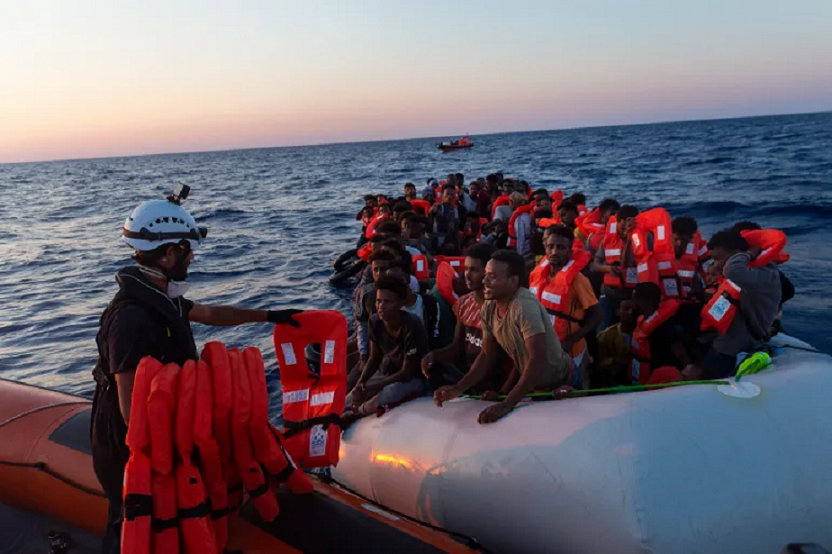
The aid group Doctors Without Borders has reported recovering 11 bodies and rescuing dozens of people off the coast of Libya as it criticised the migration policies of the North African country and European countries.
In a statement on Friday, the group, known by its French initials MSF, said its Geo Barents rescue vessel managed to recover the bodies following a search operation lasting more than nine hours after being alerted by German nongovernmental organisation Sea-Watch, which also rescues refugees and migrants.
“As we cannot determine the reason behind this tragedy, we know that people will continue to take dangerous routes in a desperate attempt to reach safety, and Europe must find safe and legal pathways for them,” MSF said in a post on X. “This catastrophe must end!”
Sea-Watch said it is unclear whether the bodies were victims of a previously unknown shipwreck, adding that they tried to contact Libya’s coastguard to go and retrieve the dead, but received no reply.
“The so-called Libyan coastguard – financed by the EU – ignored our call demanding that the bodies be recovered,” the group said.
Thousands of people trying to head from Africa to Europe use Libya as a departing point, with the Italian island of Lampedusa the nearest European destination as they undertake the dangerous journey across the Mediterranean to escape war, poverty and persecution.
Italy, which wants to put a stop to the migration stream, has said Libya and neighbouring Tunisia must do more to stop people from going to sea. It has also clamped down on the operation of the rescue ships, arguing that they encourage people to head to Europe, a charge that is denied by the charities.
Emphasising its policy on the rescue ships, Italy said on Friday that it forced the MSF rescue vessel to take the 165 people that it had saved from boats in the Mediterranean operation to the northern port of Genoa. The port was more than 650 nautical miles (1,200km) from their position and much farther than the more convenient ports in nearby Sicily, significantly delaying assistance to the rescued.
The route in the central Mediterranean is the most dangerous migrant crossing in the world, with the United Nations registering more than 20,000 deaths and disappearances in the area since 2014.
More than 3,000 refugees and migrants went missing in 2023 while attempting to use the route, according to the International Organization for Migration.
According to Italy’s interior ministry, the number of arrivals in the country has dropped in 2024 to fewer than 21,800 people since the beginning of the year, compared with close to 53,300 in the same period last year.
[Aljazeera]
Latest News
Mustafizur, Rishad, Hridoy dazzle in Bangladesh’s tight two-wicket win over Sri Lanka
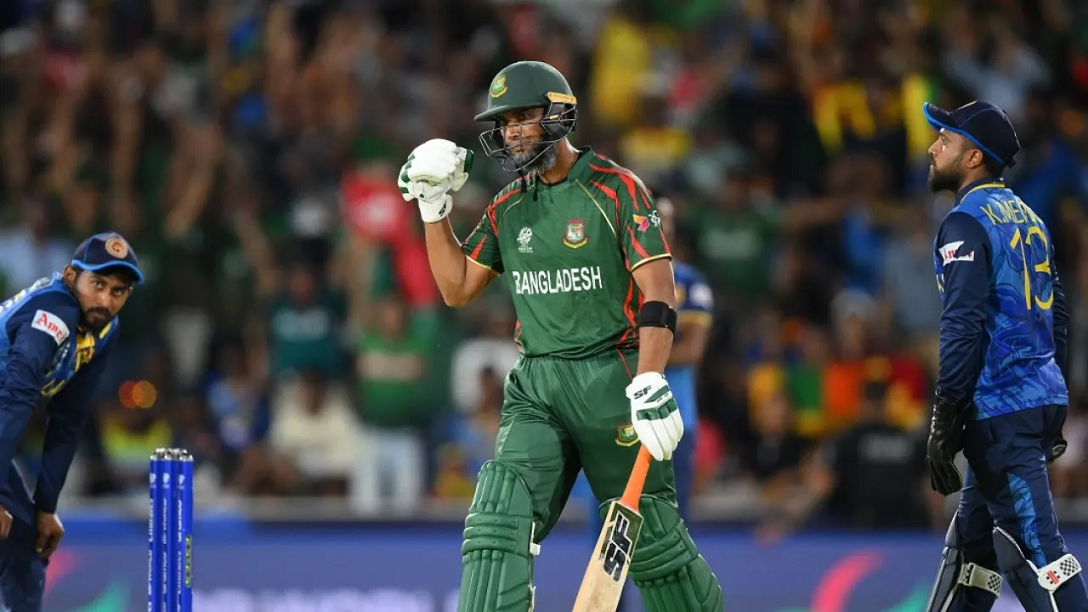
Nuwan Thushara’s last over brought Sri Lanka screaming back into the match,as he first bowled Rishad Hossain, and then nailed Taskin Ahmed in front of the stumps with a pinpoint swinging yorker. This left Bangladesh eight wickets down, with 12 runs still to get.
However, the experienced Mahmudullah was at the crease for Bangladesh, and despite some further nervy moments, pushed Bangladesh across the line off the last ball of the 19th over.
But this was a match chiefly decided by Bangladesh’s own outstanding bowling. Mustafizur Rahman was the best among them, using shorter lengths and his cutters efficiently, to claim figures of 3 for 17. Rishad Hossain’s three-for through the middle overs also kept Sri Lanka quiet.
Mustafizur was instrumental in Sri Lanka’s downward spiral through the middle overs, which culminated in a crash-and-burn end. Ultimately, their inability to find boundaries, or even rotate strike against good Bangladesh bowling resulted in their downfall. A score of 125 for 9 always seemed poor on a decent pitch, even if their bowlers made a match of it in the end.
Brief scores:
Bangladesh 125 for 8 in 19 overs (Towhid Hridoy 40, Litton Das 36; Dhanajaya de Silva 1-11, Nuwan Thushara 4-18, Wanidu Hasaranga 2-32, Matheesha Pathirana 1-27) beat Sri Lanka124 for 9 in 20 overs (Pathum Nissanka 47, Dhananjaya de Silva 21; Tanzim Hasan Sakib 1-24, Taskin Ahmed 2-25, Mustafizur Rahman 3-17, Rishad Hossain 3-22) by two wickets
[Cricinfo]
Latest News
Rashid, Farooqi and Gurbaz the stars as Afghanistan crush New Zealand

Afghanistan boosted their Super Eight chances with yet another dominating win, this time thumping New Zealand by 84 runs in Providence. Having beaten Uganda by 125 runs in their opening match, they are now at the top of Group C with a net run rate of 5.225.
After being sent in, Rahmanullah Gurbaz and Ibrahim Zadran gave Afghanistan a start of 103 in 14.3 overs. It came off the back of the 154 the pair added against Uganda, thus making them the first opening pair to register two successive century stands in the history of the T20 World Cup.
Afghanistan’s was an innings of two halves. They scored 55 for no loss in the first ten overs and 104 for 6 in the last ten, with Gurbaz contributing 80 off 56 balls. New Zealand, who had decided not to play any warm-up games, looked every bit rusty as their fielders dropped catches and missed run-out opportunities.
With the pitch assisting both seamers and spinners, chasing 160 was not going to be easy. But few would have expected New Zealand to collapse in the manner they did.
Fazalhaq Farooqi picked up three wickets in the powerplay and Rashid Khan three just after it. Eventually, both ended with identical figures of 4 for 17 as New Zealand were bowled out for 75 in the 15.2 overs. Glenn Phillips and Matt Henry were the only New Zealand batters to reach the double digits.
Trent Boult found some swing in the opening over but Gurbaz and Ibrahim showed their intent by picking up three fours off Henry from the other end. Both batters had luck on their side, too. Gurbaz got a second life when he skipped down the track to Santner and missed the ball, which went on to brush the leg stump but the bails did not budge. In the following over, Finn Allen dropped Ibrahim off Henry at the deep-square-leg boundary.
That was not all. Gurbaz got another reprieve after being involved in a miscommunication with Ibrahim. Having taken off for a single, Gurbaz had to retrace his steps and would have been run out had Conway not fumbled the throw.
Two balls later, New Zealand finally seemed to have found success when Santner pinged Ibrahim’s pads and umpire Kumar Dharmasena ruled it lbw. But the batter got the decision overturned on review as the ball was heading down the leg side. Immediately after that, Ibrahim hit Santner for an inside-out four as Afghanistan ended the powerplay on 44 for no loss.
New Zealand went against the prevailing wisdom of not bowling an offspinner when two right-hand batters at the crease, and Michael Bracewell repaid that faith by conceding only six off his first two overs.
Lockie Ferguson was even more frugal, going for five in his first two. He could have had Ibrahim off a slower full toss but a leaping Kane Williamson failed to pull off a one-handed stunner at mid-off. That meant while Afghanistan remained unscathed, they had only 55 on the board after ten overs.
Afghanistan had not hit a single six in the first ten overs, but there were five in the next three, including three in one Bracewell over as Gurbaz and Bracewell stepped on the accelerator. The pair took the side past 100 in the 14th over. New Zealand finally broke through when Ibrahim bottom-edged a short ball from Henry onto his stumps, after having been hit on the grille on the previous delivery.
Promoted to No. 3, Azmatullah Omarzai played his part with 22 off 13, which included two sixes in three balls off Henry. Mohammad Nabi fell for a first-ball duck but Gurbaz kept finding the boundary at regular intervals. However, a three-wicket, three-run final over by Boult kept Afghanistan to 159.
Farooqi gave Afghanistan a dream start with the ball. With the very first delivery of the innings, he uprooted Finn Allen’s leg stump as the ball moved in late. In the seamer’s next over, Conway pushed at one that seemed to come slower off the surface and was caught at extra cover.
The decision to give Farooqi a third over in the powerplay brought further rewards. This time, bowling around the wicket to Daryl Mitchell, he got a length delivery to just straighten and take the outside edge. Gurbaz took a regulation catch to complete the dismissal and leave New Zealand 28 for 3.
It could have been worse for New Zealand. In between, Naveen-ul-Haq had rapped Kane Williamson’s front pad after the batter had moved across to play a delivery. Afghanistan sent it upstairs for an lbw review but the umpire’s call saved the New Zealand captain.
Afghanistan did not have to wait too long for Williamson’s wicket. Rashid brought himself on after the powerplay and struck straightaway as Williamson guided one to first slip. But Rashid was just warming up. In his next over, he dismissed Mark Chapman and Bracewell off successive deliveries to leave New Zealand on 43 for 6. Chapman went for a pull and got bowled; Bracewell was late to bring his bat down and was lbw.
Phillips was New Zealand’s last hope. He did hit a couple of boundaries but was soon caught at long-on when he tried to take on Nabi. That ended any hopes of revival New Zealand might have had.
Brief scores:
Afghanistan 159 for 6 in 20 overs (Rahmanullah Gurbaz 80, Ibrahim Zadran 44, Azmatullah Omarzai 22; Trent Boult 2-22, Matt Henry 2-37, Lockie Fergusoan 1-28) beat New Zealand 75 in 15.2 overs (Glenn Phillips 18; Rashid Khan 4 for 17, Fazalhaq Farooqi 4 for 17, Mohammad Nabi 2-16) by 84 runs
[Cricinfo]




